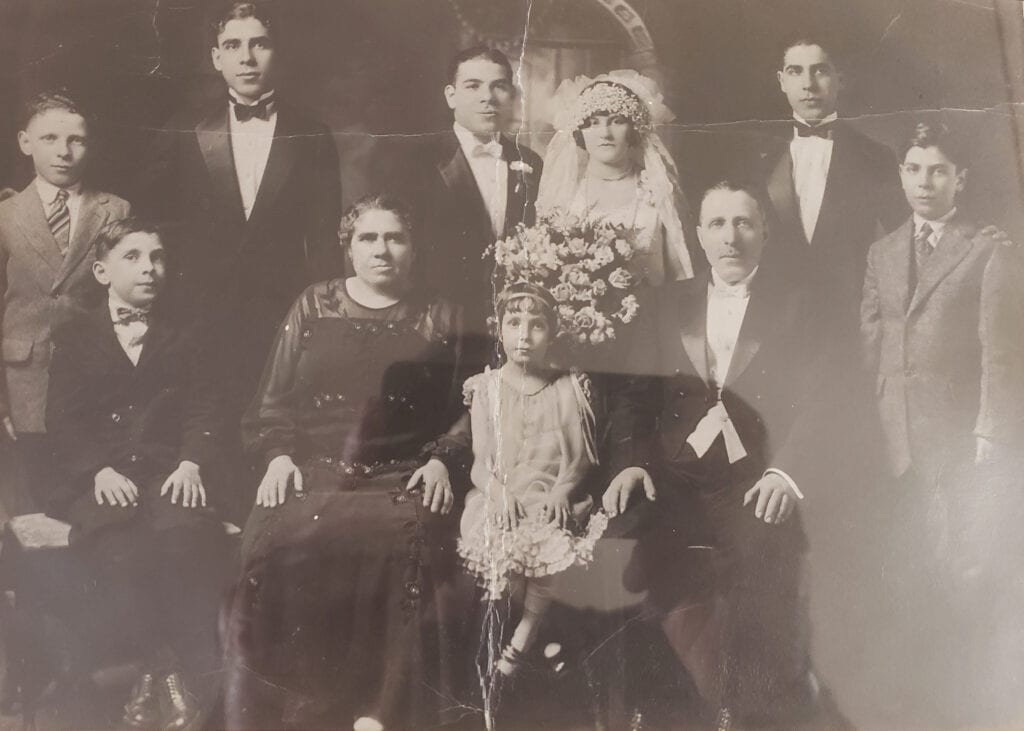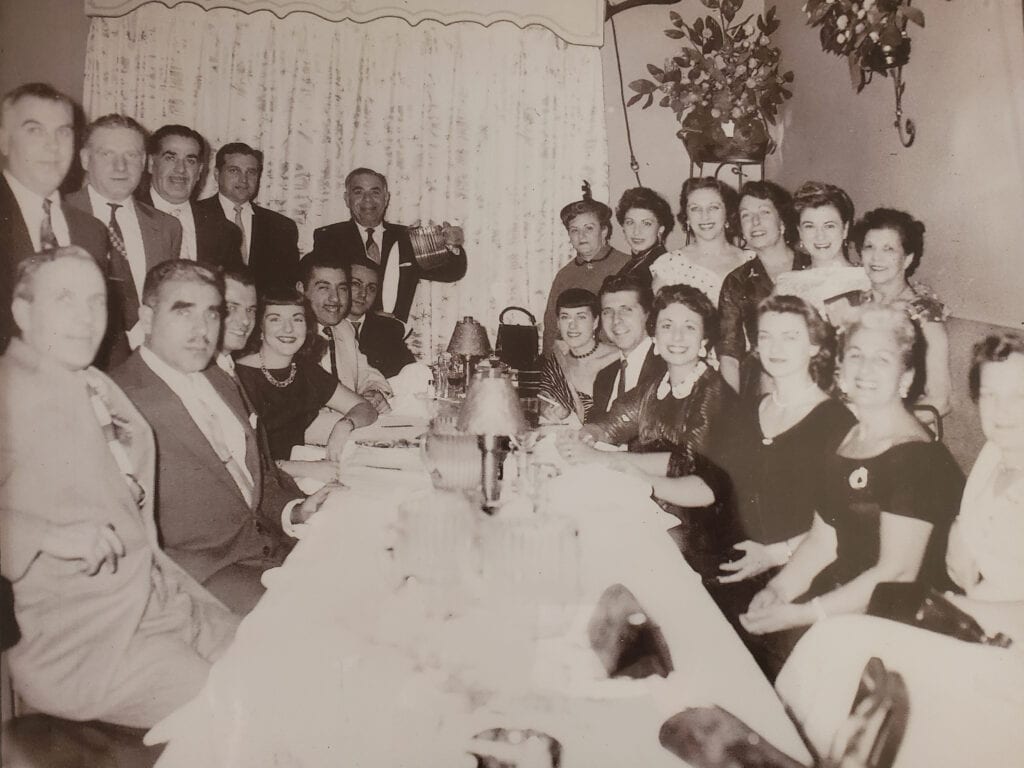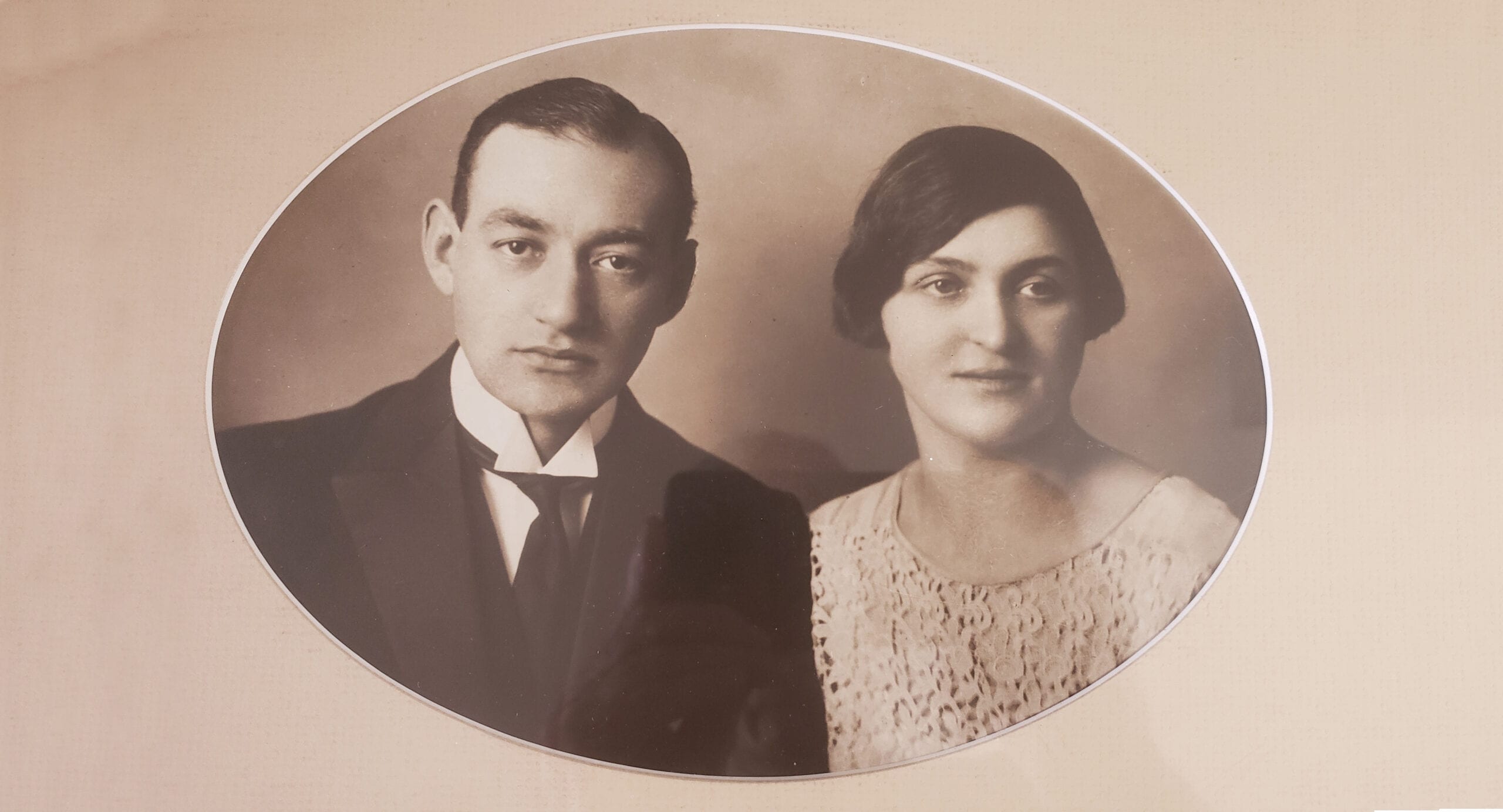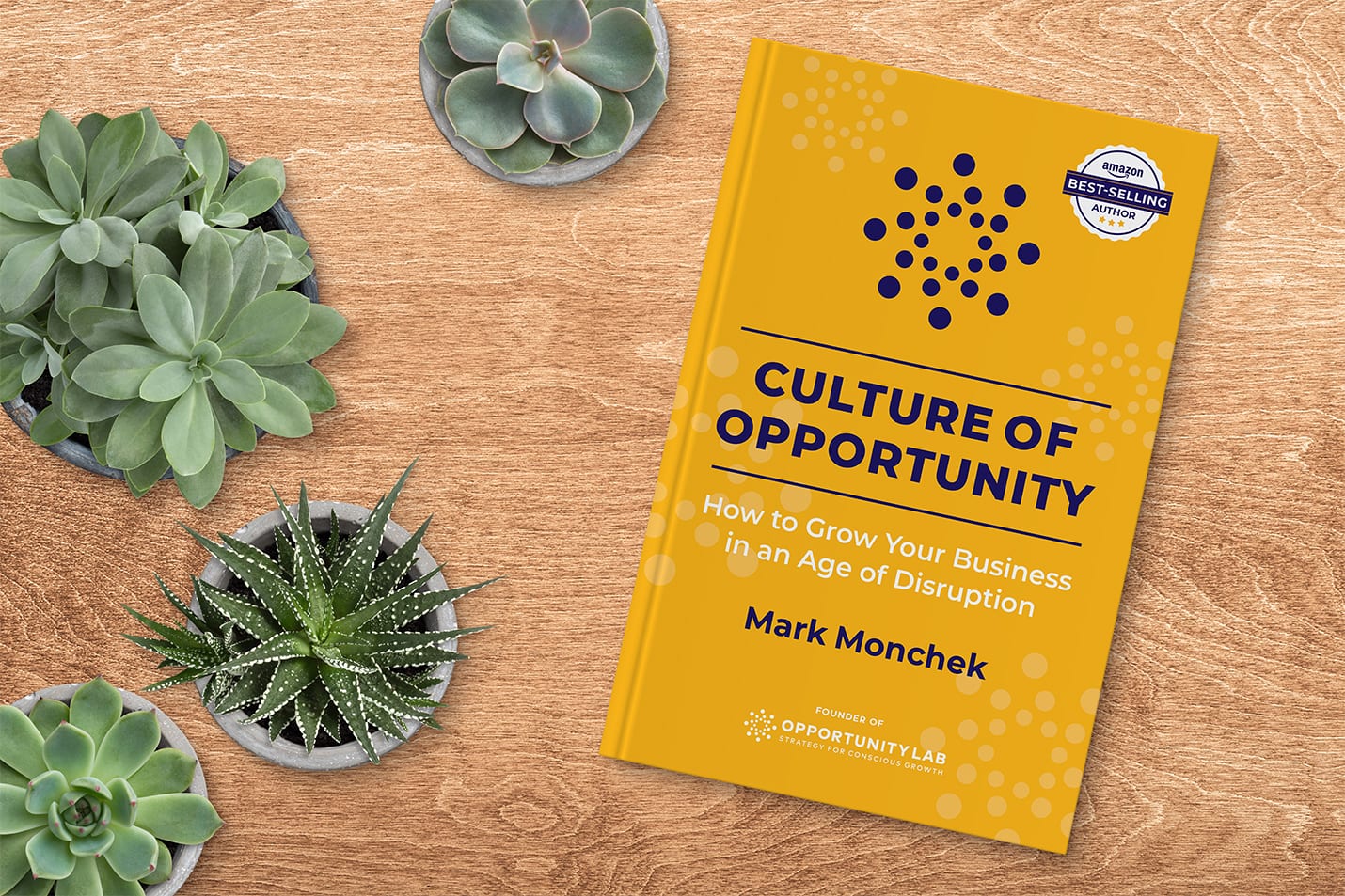Dear readers,
My name is Paul West. I’m a NYC-based writer, educator, and coach, and as of this past fall, I’m a proud member of Opportunity Lab’s vibrant think tank–known, fittingly, as the Opportunity Community. Recently, on a historically snowy New York City day, I sat down for a virtual chat with Opportunity Lab’s founder, Mark Monchek; I hope you’ll enjoy it as much as I did.
Paul West: I know Opportunity Lab has a compelling origin story. Tell me about it.
Mark Monchek: Well, you could say the origin story goes back many generations. It starts in Eastern Europe, with my father’s family; they came to the United States through Ellis Island, among the two million Jewish immigrants that came here between 1880 and 1920. They came from Poland and Russia, without any formal education or profession; just a steamer trunk and a dream.
PW: Mmm. “A steamer trunk and a dream.” I like that.
MM: They settled in Brownsville, Brooklyn. They lived on Bristol Street, near Pitkin Avenue. My father, Meyer Monchek, was born in 1909, one of seven children and the only one of the seven to go to college. He knew, from the time that he was a little boy, that his way out of the ghetto was to be educated–and he wanted to become a doctor. All of his other siblings became entrepreneurs, and right after World War II they started a family business: Shepher Toy, which still exists today. They were toy wholesalers, who bought toys from manufacturers and sold them to retailers out of their living room. Knowing what it would take to become a doctor, my father was a straight-A student, first at Boys’ High School and then at NYU.
PW: So the theme of opportunity is in your family history: first your great grandparents coming here with next to nothing, then your father’s determination to go to medical school….
MM: Well, Paul, my father found himself in a very difficult position. He wanted to become a doctor in the worst way; but there was a Jewish quota in US Medical Schools, a quota which did not completely end until 1970. So even though he was at the top of his class, he could not get into any medical school, though he applied to almost every one on the East Coast. But my father had a ferocious ambition–nothing was going to stop him–so he decided to apply to the University of Vienna, partly because his parents spoke Yiddish and he’d studied German in high school.
In 1935, during the heart of the Great Depression, my father traveled third class for six days on a boat to France, and then by train to Vienna, Austria. He studied medicine at the University of Vienna for three years, returning home each summer to work in the Post Office to earn enough money to return to school. Then, in 1938, Hitler invaded Austria and all American citizens were ordered to go home.
PW: Trying to keep Americans safe from the coming war.
MM: But my father had spent three years studying medicine in Austria, and there was no way he was going to once again have being a Jew deprive him of his dream. So he took a train to Switzerland, which had remained neutral during the war, and he got his degree at the University of Basel. He came back to Brooklyn in 1939 and worked at the Unity Hospital–riding an ambulance, which is what many interns did back then. My mother, who was a Jew living in Germany, was about to be shipped off to the camps, and she and her parents and two brothers escaped in 1938. So while my father was escaping to Switzerland, my mother and her family were escaping to America.
PW: Do you know how your mother and her family escaped?
MM: My mother’s father, Joachim Schutlz, was an entrepreneur who started a fine artist’s brush business in Germany. His dream, which was to use his business to rise from poverty and give his children opportunity, was stolen by the Nazis. He got a visa from a relative in the United States, and emigrated here with his family to start anew.


PW: Wow. So both your parents, in a manner of speaking, narrowly missed dying in the Holocaust.
MM: Yes, and then narrowly missed having their dreams taken from them.
PW: And in your dad’s case, he went over there to pursue his dream–and rather than leave when the war began, he just relocated elsewhere in Europe. That’s really an opportunity mindset put to the test.
Being an outsider can be a huge disadvantage, but it can also be a huge advantage.
MM: Yes. This is where I learned the importance of resilience amidst trauma and radical disruption. Both my parents and their families desperately wanted to be accepted in worlds in which they were regarded as outsiders. Being an outsider can be a huge disadvantage, but it can also be a huge advantage.
PW: How so?
MM: When you’re an outsider, you are forced to be innovative, be more persistent, and rely on other outsiders for help.
PW: So your father and his family, and your grandfather and his family, had the advantage which came from being an outsider?
MM: Yes. My grandfather Joachim—Josh is what he was called—started all over again, on Bleecker Street in Greenwich Village. He totally reinvented his business for the American market; and it took only a few years before he was successful enough to move to Mount Vernon, just north of New York City. Then he heard about Operation Bootstrap.
PW: Which was?
MM: In 1947, the US government in Puerto Rico had a plan to entice US companies. They did this by providing labor at costs below those on the mainland, access to US markets without import duties, and profits that could transfer to the mainland free from federal taxation. My grandfather built a plant in Arecibo, and he sent his oldest son–my uncle Fred–to run the factory there. By 1968, his business was so successful that he sold it to Binney & Smith, the company that makes Crayola Crayons, and he retired.
PW: And, your father’s side of the family?
MM: When my father’s brothers started Shepher Toy, there were hundreds of small distributors in the New York Metro area. They had little money to start their business, and they needed every advantage they could get. How would they stand out? Well, my uncle Danny had served in World War II, and had learned about the explosive economic growth of Japan and South Korea. My uncles began buying from manufacturers in those countries, to gain an edge on their competitors. They also specialized in closeout items; most of their customers were small, local retailers and flea markets, many of which were in low income communities., and they won their business by offering low-cost items. Also, because having many small retailers and seasonal businesses was a key to their success, they made their credit department one of their core strengths. By offering credit where other distributors wouldn’t, and making warehouse efficiency and speed of delivery a core component, they built strong, lasting relationships.
PW: So everybody in your family was an entrepreneur–except for your parents?
I grew up at the intersection of psychology, art, and entrepreneurship.
MM: Yes. My father, as I mentioned, was a physician, first a general practitioner and later a psychiatrist and psychoanalyst. My mother was an artist, a writer and painter. So I grew up–my part of the origin story is that I grew up at the intersection of psychology, art, and entrepreneurship.
PW: I feel like there’s a creative undercurrent to Opportunity Lab, your approach to it, and the people you seek out and draw in; so there’s a consistency to that, too, not just the entrepreneurial aspect. There’s an undercurrent of creativity, of being friendly and welcoming to creatives.
Creativity, innovation, and a respect for the art of business are key parts of our SuccessDNA.
MM: Yes. Creativity, innovation, and a respect for the art of business are key parts of our SuccessDNA.
PW: So, bringing it forward: it’s in your family legacy to have this entrepreneurial creativity. How does Opportunity Lab use its creativity to support a client’s growth in this ever-changing landscape, amid all the disruption?
MM: Paul, I’ll use the only thing I learned from high school geometry to tell you about one key way we use our creativity to help our clients unlock theirs. Archimedes, the Greek mathematician, said, ‘Give me a lever, a fulcrum, and a place to stand, and I can lift the Earth.’ So if the Earth is our clients’ business, then we help our clients step back from their business and find a place to stand. From that place, beyond the day-to-day issues they encounter, they’re able to see what could be: what they can’t see when they are immersed in what is.
Next, we help them find a place to put their lever, and their fulcrum, which is the point of leverage. By putting their resources–people, processes, technology, et cetera–at that point of leverage, they can get their business to the next level of growth. For Adorama, that point of leverage was to focus on things their customers desperately needed to survive. Laptops, webcams, printers, home automation, and PPE were a few examples. For Opportunity Lab, we focused on creating two programs, Share Lab and Opportunity Community, that helped our clients manage through this shaky terrain.
PW: That’s a great metaphor. What is Share Lab, specifically?
Share Lab is a combination of a town hall, a focus group, and a group coaching session
MM: Share Lab is a combination of a town hall, a focus group, and a group coaching session, that helps our clients’ employees feel cared about, connected, and functioning effectively during disruption.
PW: And how has Share Lab evolved over the past year?
We knew we needed to create content to help our clients navigate time and stress.
MM: Listening to our clients’ staff during the Share Lab sessions, we heard how the pandemic had radically changed their routines, extended their workdays into their personal lives, and forced them to work while in a state of trauma. Hearing this, we knew we needed to create content to help our clients navigate time and stress.
PW: That’s a compelling example. Since adaptation has been a recurring theme, what are you learning about it?
MM: Paul, more than ever I think people are naturally resilient. There’s this cliche that people don’t like change; but if we as a species didn’t change, we wouldn’t be here. Now, you could argue that we’re on the brink of not being here any longer–because we’ve allowed the planet to become unsustainable, because we’ve refused to change. But I think the reason we resist change is not because people don’t like to change. They don’t like to be changed.
PW: How do you mean?
MM: When you force change on somebody, when you say you must wear a mask, you must take the vaccine, you must do this or that…people–I think Americans resist being told what to do. If you educate people, and tell them, ‘here’s what we’re dealing with, here are some people who have some knowledge of what we’re dealing with, here’s what we can do about this,’ they’ll respond more positively. This way, we’re educating people, we’re inspiring people, we’re rewarding people, and we’re connecting people, rather than just forcing people to change.
PW: As a historian, I think you’re right: if humans didn’t change, we wouldn’t still be here; or if nothing else, we’d still be fighting our wars with rocks and sticks. But at the same time, Covid has put on display the problem that change is often resisted at a societal level. It seems like Opportunity Lab is attempting to put people in the position to recognize opportunities for change themselves, so then they feel inspired to do it–rather than telling clients, ‘this is what you need to do to advance your business.’
I think people are a lot less resistant to change than we think.
MM: Yes, Paul, exactly. I think when you create an environment in which people are respected, their opinions are heard, and you’re giving them the tools to be able to change… I think people are a lot less resistant to change than we think. Let’s use a recent example: our client, Adorama, was an organization which was very much used to a 9 to 5 existence, in a physical space, for the decades since they were founded. Yet in the course of a week, they were able to move 75 percent of their workforce to work remotely. They were motivated because their company said, ‘we want you to be safe, we’re going to ship you the technology, we’re going to show you how to use it, we’re going to give you Opportunity Lab to help with the social and psychological adaptations, we’re going to give you the tools to communicate with your team and the rest of the company.’ I think they were inspired by how they were being treated by the company, and how they felt heard, and they gave us advice on how we should complete this process.
PW: Going back to what you said about the trajectory and temperament of people and organizations, you could argue that New York City is an adaptive place unto itself. If you look at the constant influx of immigrants, the kind of diversity we have, the fact that we’re an international hub of activity, you could argue that we’re–not uniquely, but rarely equipped to make these kinds of adaptations. Because of our awareness and embrace of constantly changing variables.
MM: I imagine it has. There are other cities and places that have adapted well. If you look at Rwanda, for example, a poor country that doesn’t have a legacy of technological innovation, they’ve done well during Covid. Taiwan and Vietnam are other examples.
PW: Right, it’s not a cultural thing, but a country that has faced so much adversity in some ways is equipped to adapt well. So the perception that you need to change is a core element in the ability to evolve, and to continue to change and grow?
MM: Yes. Going back to the example of Archimedes, we help clients continually step back from the organization they’re deeply enmeshed in and look at what’s actually there. Not what they want to be there, not what they think should be there, but what is actually there. We do that by using surveys and assessments, and by talking to people and listening. Our Share Lab program was instrumental in getting feedback throughout our client’s organization, really hearing what people are thinking and feeling and needing, and relaying that to the senior leadership to help them adapt through a very difficult period.
PW: So we’ve established that people can change, but that by and large, they’re frequently resistant. I’m sure you’ve encountered that, even in willing clients. What’s the biggest challenge you’ve faced in implementing your approach?
We look for clients who are fiercely committed to being better leaders and having better companies.
MM: The biggest challenge, first of all, is actually picking the right clients. We know that we can’t work with every single client, just like a coach can’t work with every single player; so it starts with attracting clients that align with our vision. We look for clients who are fiercely committed to being better leaders and having better companies—that want to continue to grow, and understand that they’re not going to grow if they become complacent. They have to enjoy the excitement of change and evolution. They also have to be inclusive and diverse: bring in people with different views, as well as people of different colors, cultures, gender orientations, and socioeconomic backgrounds.
PW: Okay, we’ve covered the hazards; how about the successes? What are the best moments of it all?
The big victories are an accumulation of small victories.
MM: Well, I think that similar to sports–for example, when you’re teaching someone to pitch a curveball or to learn a different style of play–it’s about celebrating small victories. The big victories are an accumulation of small victories. A culture that appreciates people’s efforts, even when they’re not successful…that celebrates victories, even those that might be considered small…that’s a culture that’s set up for success. The small wins get the medium-sized wins, which in turn get the larger wins.
PW: I love that. I couldn’t agree more. Now, taking it one step farther: when you, personally, reflect on the ‘this is why I do this’ moments…talk about one of those moments.
MM: I think among the most rewarding experiences that happen to me, literally every day, is that our staff surprises me all the time. They come up with new ideas, new approaches. Janie Brookshire and I are working on a program called Managing Performance, for one of our clients; she took a program she’s done over the years, and kind of matched it with a program I’ve done over the years. We came up with a model for two 90-minute sessions, which piggyback on some SMART goal trainings that Adorama has recently completed.
PW: And by SMART goals, we’re talking about the acronym?
It’s important to be loving and compassionate, just because a person is alive. Not because they work for you, not because they produce anything, but because they’re human.
MM: Yes. So every one of our staff surprises me at least once or twice a week, with their creativity, with their commitment, coming up with something I never thought of, doing some innovative research. One of the most exciting things is having a staff that I’m constantly learning from: learning from their creativity, learning from their commitment. And empathy, however empathetic I thought I was before. Completely understanding that even though your business is important…when you hear that someone’s mother died, someone’s father died, someone’s child is sick and really threatened with illness…400,00 Americans died last year, which is more than died in any single year of the Civil War…it really creates a need to be more compassionate. It’s important to be loving and compassionate, just because a person is alive. Not because they work for you, not because they produce anything, but because they’re human. Because we’re a living thing, we deserve that care and compassion.
PW: Well said. All right, let’s close on this: what’s your outlook for 2021? Projecting forward, for you, for Opp Lab, for New York–any way you see fit.
If the pandemic has taught me anything, it’s that we are responsible for the planet. We are responsible for managing through Covid, and keeping ourselves safe… we’re responsible for making a better world.
MM: You know, people ask me often, ‘what do you think 2021 is gonna be like?’ I say, it’s what we make it. What we–capital W-E–make it. If the pandemic has taught me anything, it’s that we are responsible for the planet. We are responsible for managing through Covid, and keeping ourselves safe… we’re responsible for making a better world. We elected the government, we’re the citizens; let’s get busy being part of the solution. My favorite quote of all time is from Bruce Springsteen: ‘nobody wins until everybody wins.’
PW: That’s a good one. Well, this has been a good talk. Thank you!
MM: I enjoyed it, thank you.
Main photo: Mark’s maternal grandparents Joachim and Hannah Schultz in Germany, circa 1910

